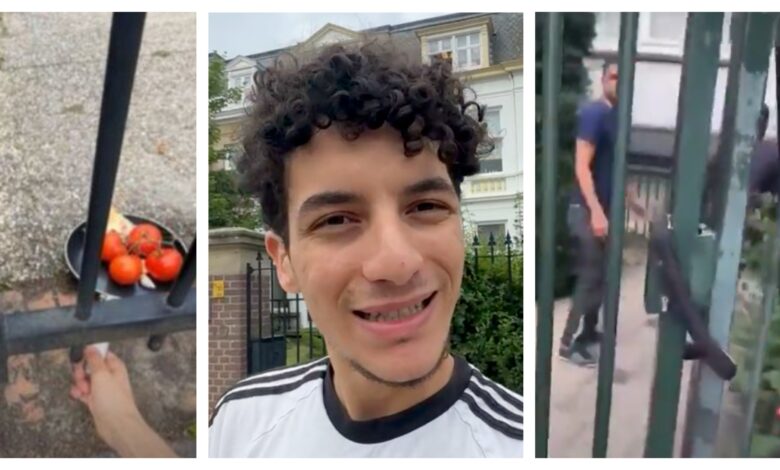“Lock the Doors They Ignore”: Anas Habib’s Bold Protest to Break Arab Complicity in Gaza Genocide

In a quiet corner of The Hague, Anas Habib locked a gate, and unlocked a new form of protest.
Last week, the 27-year-old Egyptian activist chained shut the entrance of the Egyptian embassy in the Netherlands. His message was clear: if Egypt keeps Rafah closed to Gaza’s starving, then its embassies abroad should also close.
“It was a cry of conscience,” Habib said during a live stream. “If Rafah is shut to medicine and children, then these diplomatic buildings that stay silent should be shut too.”
A New Form of Resistance
Habib’s solo protest, broadcast live on social media, wasn’t just a stunt. It sparked a wave. Two days later, three Dutch women followed his lead, locking the same embassy gate with iron chains and padlocks. Soon after, Habib and fellow activist Adham Hassanein chained the Jordanian embassy in The Hague, protesting Amman’s silence and complicity.
The goal? Pressure Arab regimes to break their complicity in Israel’s genocide in Gaza.
“What’s happening in Gaza is a crime,” Habib told Quds News Network in an emotional interview. “And those who remain silent, especially those nearby who call themselves Arab or Muslim, are partners in that crime.”
Habib’s story is shaped by resistance. At 16, Egyptian authorities jailed him for two years. His father was imprisoned too.
“After the 2013 coup in Egypt, we were among thousands who were tortured, silenced, erased,” he said. He fled the country at 18, lived in Turkey, then moved to the Netherlands six years ago.
Now married with a young son, Habib refuses to be silent. “I’m a Muslim,” he said. “And my religion teaches me that all humans have dignity. What’s happening in Gaza is the destruction of that dignity.”
He breaks into tears as he sends a message to starved Palestinians:
“Forgive us. Please, forgive us.”
Gaza Is Starving, and the Gates Stay Shut
Gaza has been under full siege for months. Israel’s bombing and blockade have destroyed hospitals, cut off food, and caused widespread famine.
Egyptian Prime Minister Mostafa Madbouly claimed in a press conference that “the Rafah crossing was never closed for a single day from the Egyptian side.” He also claimed that Egypt has “never hesitated to allow aid in or receive the wounded.” However, aid agencies and eyewitnesses have repeatedly reported that the crossing remains effectively shut, with thousands of tons of food and medical supplies stuck at the border. For Palestinians in Gaza, these statements ring hollow as starvation deepens and ambulances wait in vain.
“Egypt has the legal right under international law to allow aid in,” Habib insisted. “Their excuse that Israel prevents it is a lie, or it means they are incapable of governing their own borders.”
He added: “How can Egypt open the sea to Israeli ships but not open Rafah to bread and medicine? The scene is absurd. Worse, it’s shameful.”
A Call for Uprising
Habib believes change won’t come easily. He wants Egyptians to realize that fighting for Gaza also means fighting their own regime.
“This system in Cairo is a client of Israel and the US. It’s a traitor. It has betrayed us all. How can a traitor rule our country?”
He continued: “If Egypt were free, if its people had power, Gaza wouldn’t be starving. We’re not asking the regime to fight Israel. We’re asking it to stop helping Israel starve our brothers and sisters.”
Despite receiving threats from pro-regime Egyptians, Habib remains defiant. Dutch police didn’t arrest him. They offered him a choice: leave or face detention. He left, but with more determination than ever.
“I hope this spreads,” he said. “Shut every embassy that enables this genocide. Let these regimes feel the pressure of the people, even from exile.”
Habib ended with a message for the Egyptian people:
“If you are oppressed and angry, know this: change comes with a price. Don’t expect freedom for free. The road is hard, but the truth is powerful, and the one who carries it must be strong.”
“Don’t adapt to injustice. Change it.”




